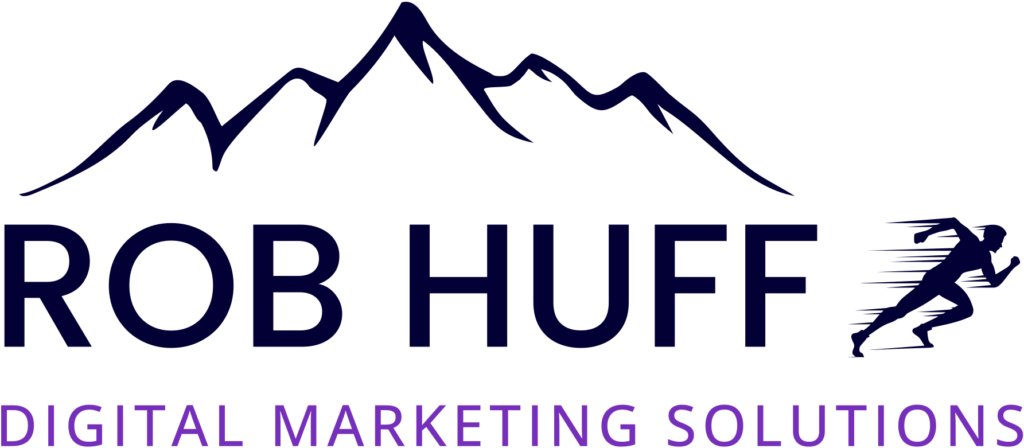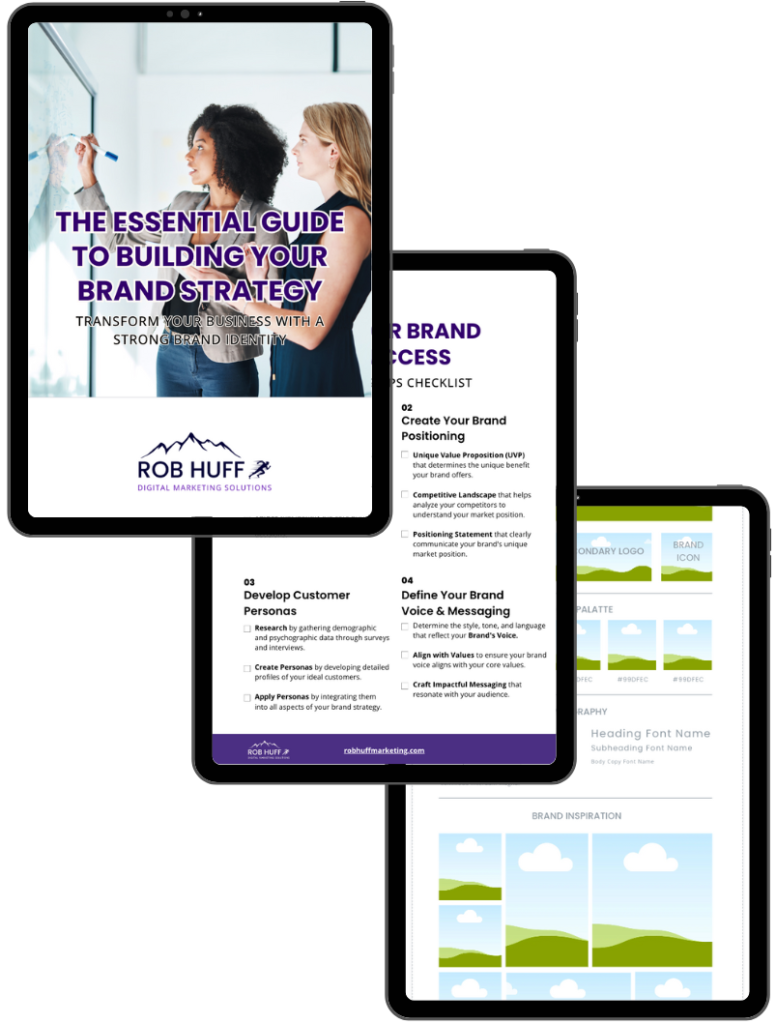In today’s digital age, mastering the art of digital marketing is the key to unleashing the power of technology for online success.
With ever-evolving strategies and advancements in technology, businesses must stay ahead of the game and connect with their target audience in meaningful and impactful ways.
Join me, Rob Huff, as I share insights and strategies to help your businesses navigate the complex world of digital marketing.
Using my extensive experience, I empower businesses to take control of their online presence and harness the full potential of technology to drive growth and achieve their marketing objectives.
In this article, we delve into the secrets of successful digital marketing, exploring various topics including search engine optimization (SEO), social media marketing, content marketing, and more.
Incorporating these key strategies into your marketing efforts can elevate your brand, boost your online visibility, and attract more customers.
Whether you’re a small business owner or a digital marketing manager, this article provides valuable tips and actionable insights on how to master the art of digital marketing and leverage technology to achieve online success.
So, get ready to transform your digital marketing game!
Understanding the Power of Technology in Digital Marketing
Digital marketing has revolutionized how your business can reach and engage with its target audience.
With the power of technology, you can now utilize various platforms and tools to create personalized and impactful marketing campaigns.
The use of technology in digital marketing enables you to analyze data, target specific demographics, and measure the success of their campaigns in real time.
- Data Analytics: By harnessing the power of data, you can gain valuable insights into your target audience’s behavior and preferences. This information can then be used to tailor marketing campaigns and deliver personalized experiences to customers. Data analytics also helps you identify trends, optimize marketing strategies, and make data-driven decisions for better results.
- Technology: Technology also allows you to leverage automation tools and artificial intelligence (AI) to streamline your marketing efforts. Automation tools help you automate repetitive tasks, such as email marketing and social media posting, saving time and resources. AI, on the other hand, enables you to deliver personalized content and recommendations to your customers based on their preferences and browsing history.
With the power of technology, you can reach your target audience more effectively, deliver personalized experiences, and measure the success of your marketing efforts in real time.
By understanding and harnessing the power of technology in digital marketing, you can stay ahead of the competition and your business can achieve online success.
The Role of Data Analytics in Digital Marketing
Data analytics plays a crucial role in digital marketing, enabling you to make informed decisions and optimize your marketing strategies.
By analyzing data, you can gain insights into your target audience’s behavior, preferences, and purchasing patterns.
One of the main benefits of data analytics in digital marketing is the ability to track and measure the success of marketing campaigns.
With tools like Google Analytics, you can monitor website traffic, conversion rates, and user engagement, allowing you to identify what works and what doesn’t for your business.
This data can then be used to optimize marketing strategies and allocate resources effectively.
Data analytics also helps businesses identify trends and opportunities. By analyzing data from social media platforms and search engines, you can identify popular topics and keywords, enabling you to create relevant and engaging content that resonates with your business’s target audience.
This not only helps attract more customers but also improves search engine visibility and brand reputation.
Furthermore, data analytics enables you to segment your target audience and deliver personalized experiences.
By analyzing demographic, geographic, and behavioral data, you can create customer personas and tailor marketing campaigns to specific segments. This personalization enhances customer satisfaction and increases the likelihood of conversions.
In summary, data analytics is a powerful tool in digital marketing, providing your business with valuable insights and enabling you to make data-driven decisions. By leveraging data analytics, you can optimize marketing strategies, deliver personalized experiences, and achieve better results.
Key Elements of a Successful Digital Marketing Strategy
A successful digital marketing strategy requires careful planning and execution. You should consider several key elements when developing your digital marketing strategy.
- Define your marketing goals and objectives. Whether it’s increasing brand awareness, driving website traffic, or generating leads, having clear goals helps you focus efforts and measure success.
- Next, you should identify your target audience. Understanding your target demographics, interests, and behavior of your target audience allows you to create personalized and relevant marketing campaigns that resonate with your audience.
- Once the target audience for your business is identified, you should choose the most effective marketing channels to reach them. This could include social media platforms, search engines, email marketing, or a combination of these channels. Selecting the right channels ensures that your business is reaching your target audience in the most impactful way.
- Another key element of a successful digital marketing strategy is creating engaging and valuable content. Content marketing plays a vital role in attracting and retaining customers. By creating high-quality and relevant content, businesses can establish themselves as industry leaders and build trust with their audience.
- In addition to content creation, you should also invest in search engine optimization (SEO) to improve your website’s visibility on search engines. Optimizing website content, meta tags, and backlinks can help your business rank higher in search engine results, driving organic traffic to your website.
- Furthermore, you should leverage the power of social media in your business’s digital marketing strategy. Social media platforms provide a direct line of communication with customers, allowing you to engage with your audience, build brand loyalty, and drive website traffic.
- Email marketing is another essential element of a successful digital marketing strategy. By building an email list and sending targeted and personalized emails to subscribers, you can nurture leads, promote products or services, and drive conversions.
- Lastly, businesses should continuously monitor and analyze the success of their digital marketing efforts. By tracking key metrics and analyzing data, you can identify areas for improvement and make data-driven decisions to optimize your marketing strategies.
A successful digital marketing strategy includes defining goals, understanding the target audience, selecting the right marketing channels, creating engaging content, optimizing for search engines, leveraging social media, implementing email marketing, and constantly monitoring and analyzing data.
By incorporating these key elements, businesses can create a comprehensive and effective digital marketing strategy that drives growth and achieves online success.
Creating Engaging Content for Digital Marketing Campaigns
In the digital landscape, content is king. Creating engaging and valuable content is essential for attracting and retaining customers, building brand reputation, and driving conversions.
Below are some tips for creating compelling content for your digital marketing campaigns.
- Understand your target audience and your prospective customer’s needs. What are their pain points? What kind of information are they looking for? By identifying these aspects, you can create content that addresses their specific needs and provides value.
- Focus on creating high-quality and well-researched content. This includes using credible sources, backing up your claims with data, and providing practical advice or solutions. By offering valuable insights, you establish yourself as an industry expert and build trust with your audience.
- Make sure your content is easily readable and visually appealing. Break up long paragraphs into shorter ones, and use subheadings, bullet points, and numbered lists to improve readability. Incorporate relevant images, videos, or infographics to enhance the visual appeal of your content.
- Make your content shareable. Include social media sharing buttons to encourage readers to share your content with their networks. This increases your content’s reach and potential to go viral.
- Become an engaging storyteller. Humans are naturally drawn to stories, so incorporating storytelling elements in your content can captivate your audience and make your message more memorable. Use anecdotes, case studies, or personal experiences to connect with your readers on an emotional level.
- Optimize your content for search engines. Conduct keyword research to identify relevant keywords and incorporate them naturally into your content. This helps improve your website’s visibility on search engine results pages, driving organic traffic to your website.
In summary, creating engaging content requires understanding your target audience, providing valuable insights, improving readability and visual appeal, making your content shareable, incorporating storytelling elements, and optimizing for search engines.
By following these tips, you can create compelling content that captures the attention of your audience and drives your digital marketing campaigns to success.
Harnessing the Power of Social Media in Digital Marketing
Social media has transformed the way businesses connect with their audience, making it an essential component of any digital marketing strategy.
Here are some tips for harnessing the power of social media to drive your digital marketing efforts.
- First, it’s important to choose the right social media platforms for your business. Different platforms cater to different demographics and interests, so identify which platforms are most popular among your target audience. Focus your efforts on those platforms to ensure maximum reach and engagement.
- Once you’ve identified the platforms, create a consistent and cohesive brand presence across all your social media profiles. Use your brand logo, colors, and tone of voice to establish a recognizable and cohesive brand identity. Consistency reinforces brand loyalty and helps your audience connect with your brand.
- Next, create engaging and shareable content for your social media channels. This can include informative blog posts, eye-catching images, entertaining videos, or interactive quizzes. Experiment with different types of content to see what resonates most with your audience.
- In addition to creating content, actively engage with your audience on social media. Respond to comments, answer questions, and participate in relevant discussions. This shows that you value your audience’s opinions and fosters a sense of community around your brand.
- Furthermore, leverage social media advertising to reach a wider audience. Platforms like Facebook, Instagram, and LinkedIn offer targeted advertising options that allow you to reach specific demographics and interests. This ensures that your content is seen by the right people, increasing the likelihood of conversions.
- Another effective strategy is influencer marketing. Collaborating with influencers who have a large and engaged following can help amplify your brand’s reach and credibility. Choose influencers whose values align with your brand and whose audience matches your target demographic.
- Lastly, regularly analyze your social media metrics to track the success of your efforts. Monitor engagement rates, reach, and conversions to identify what’s working and what needs improvement. Use this data to refine your social media strategy and optimize your content for better results.
Social media is a powerful tool in digital marketing. By choosing the right platforms, creating engaging content, maintaining a consistent brand presence, actively engaging with your audience, leveraging social media advertising, and analyzing metrics, you can harness the power of social media to drive your digital marketing efforts and achieve online success.
Optimizing Websites for Search Engine Visibility
Search engine optimization (SEO) is essential for improving a website’s visibility on search engine results pages (SERPs). By optimizing your website, you can drive organic traffic, increase brand visibility, and attract more potential customers.
Here are some tips for optimizing your website for search engines.
- First, conduct keyword research to identify relevant keywords and phrases related to your business. Use tools like Google Keyword Planner, Ubersuggest or SEMrush to find popular keywords with low competition. Incorporate these keywords naturally throughout your website’s content, meta tags, headings, and image alt text.
- Next, make sure your website’s structure is search engine-friendly. This includes organizing your content into logical categories and using descriptive URLs that include relevant keywords. And make sure your website is easy to navigate, with clear menus and internal links.
- Furthermore, optimize your website’s loading speed. Slow-loading websites not only frustrate users but also negatively impact search engine rankings. Use tools like Google PageSpeed Insights to identify areas for improvement and optimize your website’s performance.
- Pay attention to your website’s mobile-friendliness. With the increasing use of mobile devices, having a responsive website is crucial for a positive user experience. Test your website on different screen sizes and devices to ensure it looks and functions well on mobile.
- Another important aspect of SEO is creating high-quality and relevant content. Publish informative and valuable blog posts, articles, or guides that answer your audience’s questions and provide solutions to their problems. This not only attracts organic traffic but also establishes your website as a reliable source of information.
- Additionally, build high-quality backlinks to your website. Backlinks from reputable and relevant websites signal to search engines that your website is trustworthy and authoritative. Reach out to industry influencers, guest post on relevant blogs, or participate in online communities to earn backlinks.
- Lastly, regularly monitor your website’s performance using tools like Google Analytics. Track key metrics such as organic traffic, bounce rate, and conversion rates to identify areas for improvement. Use this data to refine your SEO strategy and optimize your website for better results.
Optimizing your website for search engine visibility involves conducting keyword research, optimizing website structure and loading speed, ensuring mobile-friendliness, creating high-quality content, building backlinks, and monitoring performance.
By implementing these strategies, you can improve your website’s visibility on search engines and attract more organic traffic.
Mastering Email Marketing for Effective Customer Communication
Email marketing is a powerful tool for building relationships with customers, promoting products or services, and driving conversions.
Here are some tips for mastering email marketing for effective customer communication.
- Firstly, build an email list of subscribers who have opted in to receive emails from your business. Offer incentives such as exclusive discounts, free resources, or valuable content to encourage visitors to subscribe. This ensures that your emails are reaching a receptive audience.
- Next, segment your email list based on factors such as demographics, purchase history, or engagement level. This allows you to send targeted and personalized emails that resonate with specific segments of your audience. Personalization enhances the customer experience and increases the likelihood of conversions.
- When crafting your email content, focus on providing value to your subscribers. Whether it’s sharing industry insights, offering practical tips, or exclusive offers, make sure your emails are relevant and beneficial to your audience. This builds trust and establishes your business as a reliable source of information.
- In addition to providing value, make your emails visually appealing and easily readable. Use a clean and professional design, incorporate images or videos, and break up content into shorter paragraphs or bullet points. Make sure your emails are mobile-friendly, as many people read emails on their smartphones.
- Furthermore, optimize your email subject lines to increase open rates. Use concise and compelling subject lines that pique curiosity or create a sense of urgency. Test different subject lines to see which ones resonate most with your audience.
- Another effective strategy is to automate your email marketing campaigns. Use email marketing software to set up automated welcome emails, abandoned cart reminders, or personalized recommendations based on customer behavior. Automation saves time and allows you to engage with your audience consistently, even when you’re focused on other aspects of your business.
- Finally, regularly analyze your email marketing performance. Track metrics such as open rates, click-through rates, and conversion rates to understand what strategies are working well and where there’s room for improvement. Use this data to refine your email campaigns and continuously optimize for better results.
Mastering email marketing involves building a responsive subscriber list, segmenting your audience for targeted messaging, providing valuable content, optimizing design and subject lines, automating where possible, and analyzing performance to refine your approach.
By implementing these strategies, you can enhance customer communication, drive engagement, and ultimately, boost conversions for your business.
Conclusion: Unleashing the Power of Technology for Online Success
In today’s fast-paced digital landscape, mastering the art of digital marketing isn’t just about keeping up—it’s about leading the charge.
As we’ve explored in this article, harnessing the power of technology is crucial. From data analytics that provide actionable insights into customer behavior to leveraging automation and AI for personalized marketing, technology opens doors to unparalleled efficiency and effectiveness.
Data analytics emerges as a cornerstone of success, enabling your business to refine its strategies with precision.
By understanding your audience through demographic and behavioral insights, you can tailor campaigns that resonate deeply. This not only enhances engagement but also drives conversions, propelling your business towards sustainable growth.
The key to a successful digital strategy is a multifaceted approach that integrates SEO, content marketing, social media engagement, and email marketing.
By defining clear objectives, understanding your audience intimately, and selecting the right channels, you set the stage for impactful engagement.
Continual monitoring and adaptation ensure your strategy remains agile and responsive to market dynamics, paving the way for enduring success in the digital realm.
By utilizing these elements of digital marketing, you equip your business not only to navigate but to thrive in the ever-evolving digital landscape.
Embrace innovation, leverage technology, and empower your brand to achieve new heights of online success.
Until next time,





